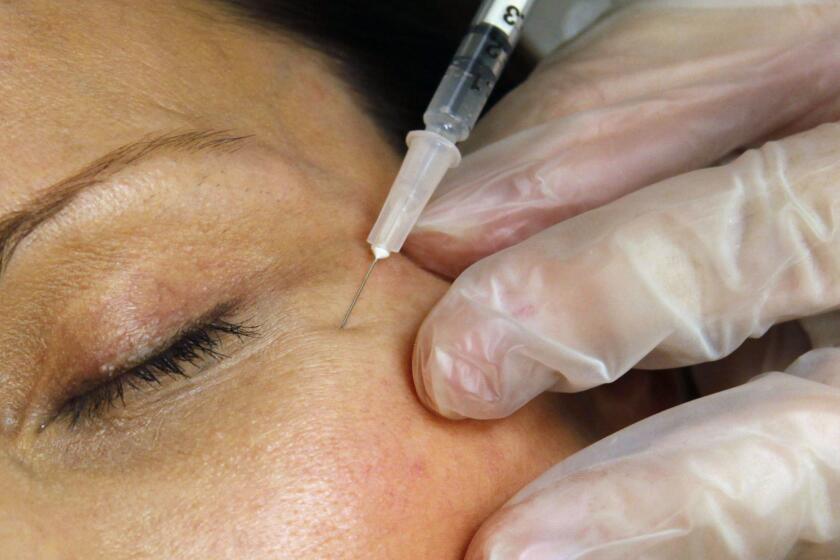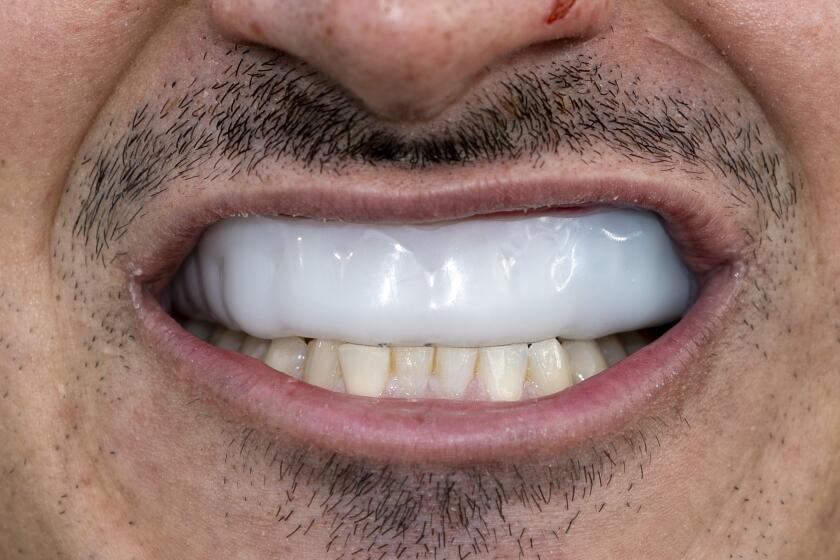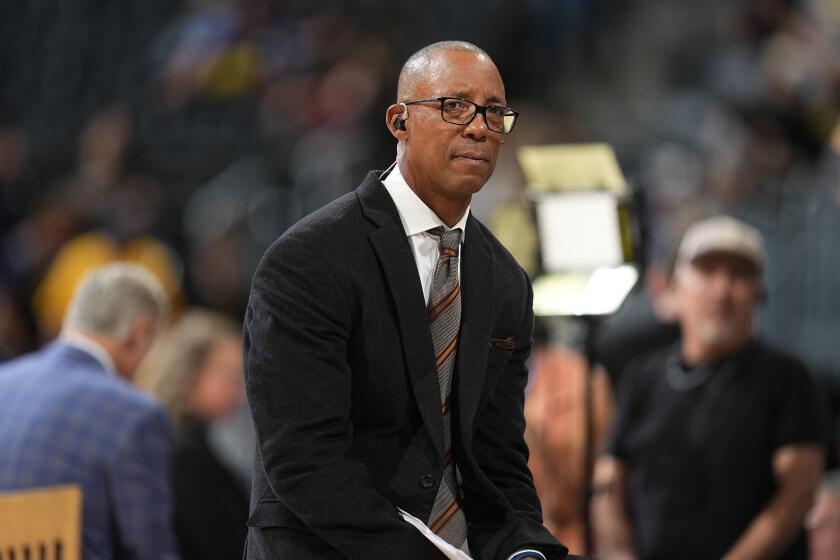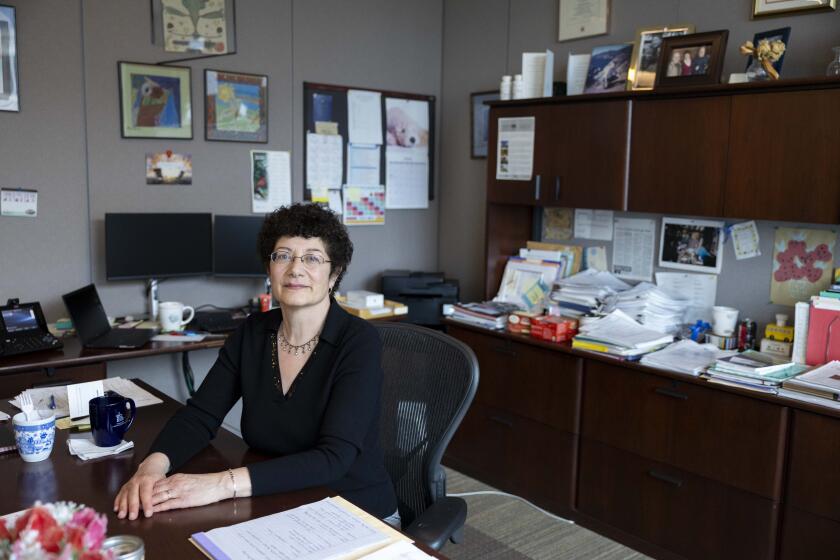San Ysidro Health Center keeps growing
New King-Chavez facility to open this week
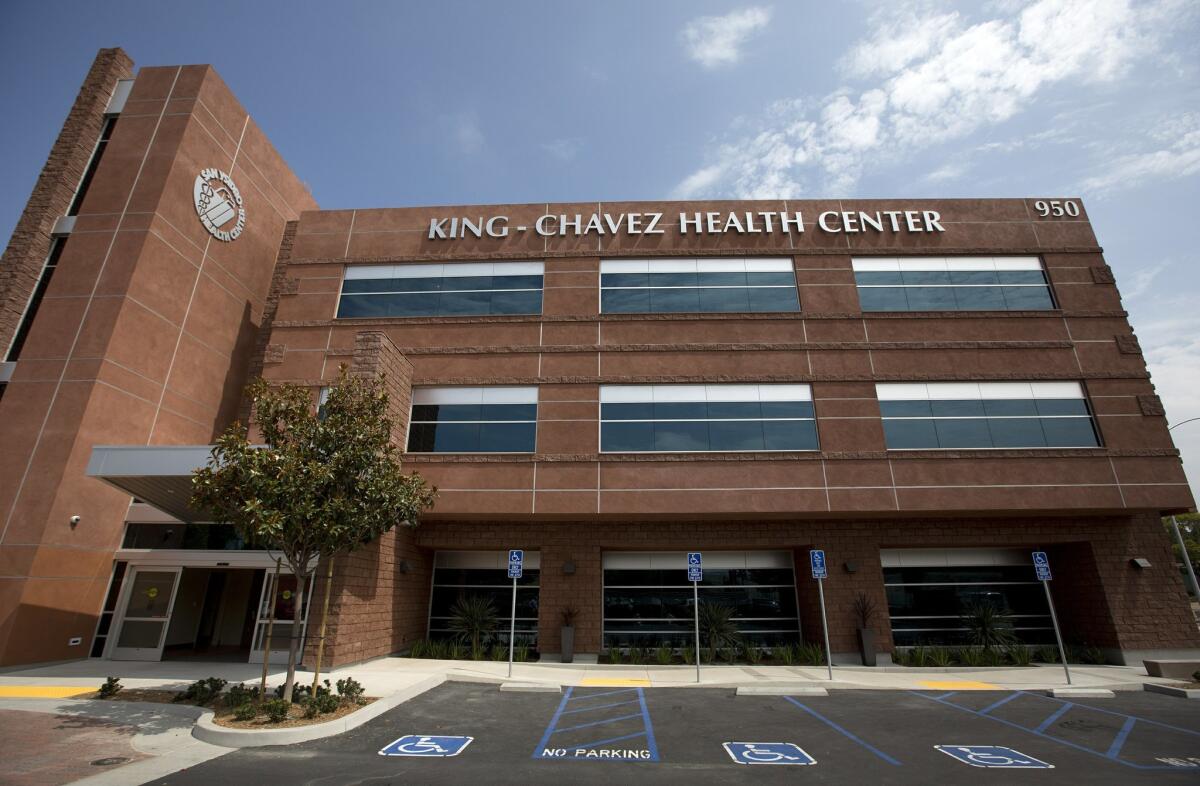
Information
For information on San Ysidro Health Center and all of its locations: www.syhc.org
Residents in southeastern San Diego will soon have a new place to turn when they need medical care.
The San Ysidro Health Center plans to open its new three-story King-Chavez Health Center this week at 950 S. Euclid Ave., where adults and children can receive medical, dental and mental health services regardless of their ability to pay.
The center, made possible by a highly competitive $9.7 million federal stimulus grant, is the San Ysidro system’s latest effort in a remarkable journey to expand care to low-income residents in underserved areas.
Since it was founded in 1969 in a rundown house by seven immigrant women determined to bring a doctor to their poor South Bay community, the nonprofit has blossomed into one of the largest community clinic systems in the county.
Today, San Ysidro Health Center has 815 employees and a $63 million annual budget to operate 10 medical clinics, four dental clinics and other programs that serve 80,000 registered patients — half of them uninsured — in South Bay and central San Diego.
“Our mission has always been to function as a health safety net providing the highest quality health care to underserved communities and to residents who don’t have the resources or insurance to pay for care,” said Chief Executive Ed Martinez. “That was the mission of our founding mothers, and it continues to be our mission today.”
The new 25,000-square-foot clinic is more than three times the size of the nonprofit’s Comprehensive Health Center three blocks to the north. Most of the services at the older clinic will shift to King-Chavez, although the Euclid Family Counseling Center will remain behind.
The handsome earth-toned King-Chavez center has its own lab and X-ray departments, and offers adult mental health services, 12 medical exam rooms and a 10-chair dental department that includes a special unit tailored for medically fragile or special needs adults.
The special needs dentistry is a partnership with A.T. Still University’s Arizona School of Dentistry and Oral Health.
Jack Dillenberg, the school’s dean, said he was pleased to work with the San Ysidro health system on its newest clinic. The school donated $200,000 to help build the dental department at the King-Chavez Health Center, where a faculty member will be on staff and fourth-year students will do rotations.
“We are the nation’s public health dental school and started the school to work with underserved communities,” Dillenberg said. “Ed Martinez and his group provide a tremendous service to the community, and I’m a big supporter of what they do. I want to help them succeed.”
Patients in the San Ysidro clinics without public or private insurance pay on a sliding scale. Counselors also help patients apply for Medi-Cal or other public programs.
County Supervisor Greg Cox attributed much of San Ysidro Health Center’s success to Martinez and his ability to secure federal, state and local grants, as well as private donations.
“San Ysidro Health Center is one of our safety nets in District 1,” Cox said. “They’re doing some remarkable things in a very tough (economic) environment. I give a lot of credit to Ed Martinez. He seems to know where the money is.”
Health center’s growth
1969: Seeing that there was only a part-time doctor serving San Ysidro, a group of immigrant mothers open a clinic in a rundown house on Beyer Boulevard with donated supplies and volunteer doctors. They enlist the UC San Diego School of Medicine to help and a federal grant is secured.
1971: San Ysidro Health Center incorporates as a nonprofit.
1972: The center replaces the house at 4004 Beyer Blvd. with a new clinic, which undergoes several expansions over the years. It remains the system’s principal medical facility.
1982: National City Family Clinic opens.
1986: Chula Vista Family Clinic opens.
1998: Ed Martinez is hired as chief executive. In less than two years, the clinic pays off a $3.2 million debt to the Internal Revenue Service.
2002: South Bay Family Dental Clinic opens in National City.
2004: Otay Family Health Center in Chula Vista is bought from Scripps Health.
2008: Assumes operations of San Diego Children’s Dental Clinic at Rady Children’s Hospital; opens South Bay Family Health and Urgent Care Center in Chula Vista; acquires Comprehensive Health Center’s three clinics in Logan Heights, Lincoln Park and downtown San Diego (downtown site later closed).
2009: Opens Paradise Hills Family Clinic in Chula Vista and the Maternal & Child Health Center on Beyer Road next to the main clinic in San Ysidro.
2010: Opens campus clinics at Southwest High School in Nestor, Palomar High School in Chula Vista, and Lincoln High School in Lincoln Park.
2012: Opens King-Chavez Health Center, moving most services from the Comprehensive Health Center three blocks away in Lincoln Park. The San Ysidro Health Center now has 815 employees and a $63 million annual budget.
Martinez, 67, was hired as chief executive in 1998 as the nonprofit was struggling, burdened with a $3.2 million debt to the Internal Revenue Service. The clinic was losing doctors, supplies arrived COD and morale was in the cellar.
“The good thing was we had an excellent staff providing good care and an established relationship with a community that trusted us,” he said.
Martinez, who has a master’s degree in public health-hospital administration from Yale University and a master’s degree in public administration from San Diego State, stabilized things and paid off the IRS debt within 18 months.
“I still have the canceled check in my office,” he said.
Martinez had plenty of health care experience behind him, having been CEO of Harbor View Medical Center in San Diego and the Community Health Center of Southern Nevada before arriving at the nonprofit.
By 2002, San Ysidro Health Center had 300 employees and a $20 million budget. Those numbers and its facilities have about tripled since then.
“They are, I think, really a remarkable organization in the way they’ve evolved and expanded and the quality of services they provide,” Cox said. “Community clinics, particularly the ones where (Martinez) works, are in medical deserts where people are without insurance and can’t afford care.”
The San Ysidro nonprofit employs a “holistic approach” in providing comprehensive services in a system that respects the cultural and linguistic diversity of the communities it serves, he said.
Dr. Ralph Hernandez employs that holistic approach every day, he said. Hernandez will move from the Comprehensive Health Center on Euclid Avenue to the King-Chavez center this week.
Hernandez grew up in the neighborhood “off Imperial Avenue,” earned a bachelor’s degree at UC San Diego and graduated from the University of Utah School of Medicine 25 years ago.
He worked at San Ysidro Health Center for a few years before moving to Kaiser Permanente. Three years ago, he returned to the health center.
“I have patients who are homeless or near homelessness. What I’m seeing is that good health requires, not just a prescription, but medical guidance, education, and support,” he said.
Hernandez mentioned a recent patient who couldn’t afford medication for his diabetes-related illnesses. That’s a question Hernandez has learned to ask.
“I let him know that we can help him,” he said. “We have staff who have the resources to look for free or low-cost medications.”
But Hernandez said a key part of his job also is education — explaining the importance of the medication and taking time to discuss diet and lifestyle changes. Many patients also suffer from depression, debilitating stress or other mental health issues that can go undiagnosed in a quick office visit.
“I’m grateful to this organization that we can take the time to find out some of the underlying problems,” Hernandez said.
He expects the new King-Chavez center to help him provide more efficient care because all services — medical, dental, mental health, lab facilities, radiology — will be under one roof.
“This has been a long time coming,” he said. “What a great gift to the community.”
Martinez said the King-Chavez clinic — like the entire San Ysidro system — is designed to create a medical home where low-income residents can get preventive care as well as comprehensive medical services.
He said that philosophy dovetails with the Obama administration’s health reform law, the Affordable Care Act, and probably helped secure the federal grant to build King-Chavez.
The clinic also serves a particularly vulnerable population. Residents in the area have substantially higher rates of diabetes, asthma, heart disease, HIV, stroke, and prostate and cervical cancers than the county as a whole, according to county health statistics.
The Affordable Care Act vastly expands Medicaid — called Medi-Cal in California — so that about 20 million more people nationwide will have coverage in 2014. The federal law envisions most going to community clinics for health care, and millions of dollars in federal grants have been issued to help clinics gear up for the influx.
Martinez said he thinks his clinics probably already see many of those uninsured in his service areas but that the clinics will benefit from getting Medi-Cal payments.
And he hopes the Obama administration will see the King-Chavez Health Center as a model program.
“It’s really a great example of what the administration is trying to do,” he said. “We’re hoping to invite President Obama out to visit us.”
Get Essential San Diego, weekday mornings
Get top headlines from the Union-Tribune in your inbox weekday mornings, including top news, local, sports, business, entertainment and opinion.
You may occasionally receive promotional content from the San Diego Union-Tribune.
